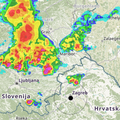Pakistani Rapist Not Deported by Croatia While Serb Deported for Three Fingers: What’s Going On?
Croatia is facing a shocking legal and moral scandal that will make you question: who is the law really for? Mohamad Sh., a Pakistani national, served four years in prison for rape in Croatia. Four years! And what happened after that? He was not deported! No, he stayed to live and work in Croatia, and now he has been arrested again for another rape. Yes, you read that right — the same man, the same country, the same state, but a different victim.
What happened?
In early June, Mohamad Sh. employed a Nepali woman in Croatia. Instead of providing her safety, he locked her in an apartment, physically abused her, and raped her multiple times. The woman bravely reported him to the police, and he was immediately arrested. But what about the law? The law on foreigners clearly states that a third-country national who has been convicted with a final sentence of unconditional imprisonment longer than one year for an intentional criminal offense must be deported. So why wasn’t this man deported?
Double Standards in Croatia?
At the same time, Croatian authorities quickly acted and deported a 22-year-old Serbian citizen for posting a photo on social media showing three fingers while riding a motorcycle. For this offense, which is far less serious than rape, the Serb was banned from entering Croatia and the EU.
Why are measures applied promptly and strictly in one case, but in another case involving a serious crime, there is no reaction? The answer lies in who requests the deportation and how the procedure is conducted. The State Attorney’s Office in the case of Mohamad Sh. did not request deportation, so he remains in Croatia. In the Serbian case, deportation was immediately requested and carried out.
What do lawyers say?
Lawyer Veljko Miljević points out that deportation is not an automatic process and that the law prescribes clear criteria when deportation must be requested. He believes lawmakers should better regulate this issue to avoid such cases.
What’s next?
It remains to be seen whether this violent man, if convicted again, will be deported from Croatia. But until that happens, the question arises: how safe is Croatia for victims of violence, and how effective is the system that is supposed to protect them?
Conclusion
This case casts a shadow over the judicial system and immigration policy in Croatia. While strict measures are applied for minor offenses, for serious crimes like rape, the system shows weaknesses and double standards.
If you have an opinion on this case or know of a similar one, feel free to share in the comments. Maybe together we can understand where the problem lies and how to fix it. Because if the law doesn’t protect victims, what is it even for?
Slug: why-croatia-doesnt-deport-pakistani-rapist-while-deporting-serb-for-three-fingers












